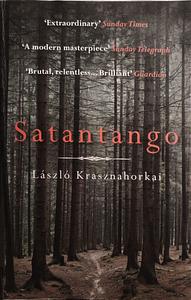Take a photo of a barcode or cover
dark
slow-paced
¡Uf! Es difícil describirla y lo que me provocó. Para empezar, y siendo totalmente sincera, no estoy segura de haberla entendido totalmente. Sin embargo, pese a ello, en ningún momento me aburrió.
La novela se divide en 12 capítulos que entrelazan distintas perspectivas en un ir y venir, como el cruce adelante y atrás de los pasos de un tango. Pero este no es un tango feliz. Trata sobre un grupo de habitantes de una villa húngara casi abandonada y aislada, que permanecen en ella tras la destrucción de la industria que les daba el sustento. Buscan distintas maneras de sobrellevar su miseria y aislamiento: dos chicas adolescentes se prostituyen en un molino abandonado, un médico alcohólico se dedica a espiar al vecindario a través de su ventana, una vecina lee con fervor la Biblia a un nivel de fanatismo extraordinario...
Un día reaparece un hombre que creían muerto y que, con un gran carisma, les dice que viene a sacarlos de ese agujero. Ellos, que ven en él a un mesías salvador, deciden seguirle y, a lo largo de 2 o 3 días y muy a su pesar, se hacen partícipes de un tango perverso que provoca claustrofobia y desazón.
¿Volvería a leerla? Definitivamente. Siento que DEBO hacerlo.
¿La recomiendo? Absolutamente.
La novela se divide en 12 capítulos que entrelazan distintas perspectivas en un ir y venir, como el cruce adelante y atrás de los pasos de un tango. Pero este no es un tango feliz. Trata sobre un grupo de habitantes de una villa húngara casi abandonada y aislada, que permanecen en ella tras la destrucción de la industria que les daba el sustento. Buscan distintas maneras de sobrellevar su miseria y aislamiento: dos chicas adolescentes se prostituyen en un molino abandonado, un médico alcohólico se dedica a espiar al vecindario a través de su ventana, una vecina lee con fervor la Biblia a un nivel de fanatismo extraordinario...
Un día reaparece un hombre que creían muerto y que, con un gran carisma, les dice que viene a sacarlos de ese agujero. Ellos, que ven en él a un mesías salvador, deciden seguirle y, a lo largo de 2 o 3 días y muy a su pesar, se hacen partícipes de un tango perverso que provoca claustrofobia y desazón.
¿Volvería a leerla? Definitivamente. Siento que DEBO hacerlo.
¿La recomiendo? Absolutamente.
I am afraid this is one very clear case of "this is me, not you, dear book" and "reading a book at the wrong time".
This book.....was a struggle. So sorry to anyone who has had to hear me talk about this for the last month and a half. I really haven't needed over 2 weeks max to read a book since I got back into reading regularly but this was tough. Extremely dense writing and hard to follow more often than not which made me feel way too stupid to be reading this, plus really heavy themes at the parts that were clearer. A binge read it was NOT.
But it was darkly funny with interesting historical context and a unique concept. The cast of characters and changing POV was interesting and gave good insight into what life was like at the time, but unfortunately that life was severely depressing! The writing style was so hard for me and my small brain, but it's cool to understand the intention of it, of wanting the reader to feel that same cyclical nature of confusion, despair, misplaced hope, pure chaos.
I can't say I enjoyed the process of reading this really, but I'm proud of myself for not giving up on it. I wanted to read Hungarian literature before going there and I sure did that! It's an important work to them, and it got me thinking about the timeline of societal change which was also kind of upsetting but valuable overall. I'm glad I finished it and I hope this is the first of many books I read to try to understand new places better.
But it was darkly funny with interesting historical context and a unique concept. The cast of characters and changing POV was interesting and gave good insight into what life was like at the time, but unfortunately that life was severely depressing! The writing style was so hard for me and my small brain, but it's cool to understand the intention of it, of wanting the reader to feel that same cyclical nature of confusion, despair, misplaced hope, pure chaos.
I can't say I enjoyed the process of reading this really, but I'm proud of myself for not giving up on it. I wanted to read Hungarian literature before going there and I sure did that! It's an important work to them, and it got me thinking about the timeline of societal change which was also kind of upsetting but valuable overall. I'm glad I finished it and I hope this is the first of many books I read to try to understand new places better.
okumak çok zor oldu benim için. anlayabildiğimden emin değilim. katmanlı yapısından ara ara ışık sızan yerlerde ilerlemek nispeten daha kolaydı. macaristan deyince magda szabó’nunki gibi bir üslup ile karşılaşacağımı düşünürken karşıma orta avrupa’nın william faulkner’ı çıktı (tarzları benzediğinden değil, ikisini de okurken zorlandığım için). yine de, magda szabó’dan az-çok bildiğim komünist dönem ve sonrası macaristanı’nın bu distopik gibi görünen (ama tam da emin olamadığım) romanın atmosferine işlediğini, karanlık ve sıkışmış hissettirdiğini söyleyebilirim (kitabı çok anlayamadığımı zaten kaçıncıdır söylüyorum, artık hislerden yola çıkarak anlatmaya çalışıyorum). başıboş çocuklar ve aslında romandaki herkesin başıboş olmasından kaynaklı kaçınılmaz bir trajedi. kitabı şöyle özetleyebilirim: anlamadığım kısımları ağır, anladığım kısımları ise daha ağır geldi. kitabın benim için tam olarak zamanı gelmemiş bütünüyle kavrayabilmem için ama öyle olabilseydi bundan memnun olur muydum bilemedim. gerçekten ağır.
challenging
dark
mysterious
reflective
medium-paced
Plot or Character Driven:
Character
Strong character development:
Complicated
Loveable characters:
Complicated
Diverse cast of characters:
No
Flaws of characters a main focus:
Yes
“...as if the whole of time were a frivolous interlude in the much greater spaces of eternity, a brilliant conjuring trick to produce something apparently orderly out of chaos, to establish a vantage point from which chance might begin to look like necessity...”
This is a hard one to review. I loved the setting, this dreary, almost post-apocalyptic estate that could be either the 1970s or the 2090s. The narrator gives so little information yet conveys a sense of bleakness that is hard to ignore. Likewise, the characters have only the bare minimum personalities, yet they engage in such petty trivialities, like real people, that its hard not to picture them as clearly thought-out individuals. They stumble about this estate, seeking means of making their fortune, drinking in the pub, dreaming of a better life. Then along comes Irimias, a charismatic swindler who has a knack for telling people what they want to hear. He returns to the estate just as a young girl has accidently poisoned herself (the best chapter) and uses this tragedy to manipulate the many docile inhabitants. He cons them into giving it all up and moving to a new estate, one equally as decrepit and abandoned as their own.
There's so much to love about this book and I totally understand its reputation. But the truth is I found the walls of text (no paragraph breaks) and the meandering sentences (often providing information that is evidently of little consequence) just became somewhat oppressive for me. I just didn't enjoy reading the thing and felt like I was forcing myself to get through it. This is all the more annoying when you know what you're reading is indeed excellent. You can patently see the artistry in his craft, the imagination in his words, the cleverness in his prose. But I just struggled to get lost in any of it (with a handful of exceptions) and found it hard to enjoy.
The ending, similarly, has another twist which, in other circumstances, I might have loved, but by that point in proceedings I was just happy to have reached the end. I can recognise the brilliance of this work whilst simultaneously acknowledging that it was a bit of a slog to read. As such, it's hard to adequately asses or fully critique the book, but I would ultimately recommend it.
There's so much to love about this book and I totally understand its reputation. But the truth is I found the walls of text (no paragraph breaks) and the meandering sentences (often providing information that is evidently of little consequence) just became somewhat oppressive for me. I just didn't enjoy reading the thing and felt like I was forcing myself to get through it. This is all the more annoying when you know what you're reading is indeed excellent. You can patently see the artistry in his craft, the imagination in his words, the cleverness in his prose. But I just struggled to get lost in any of it (with a handful of exceptions) and found it hard to enjoy.
The ending, similarly, has another twist which, in other circumstances, I might have loved, but by that point in proceedings I was just happy to have reached the end. I can recognise the brilliance of this work whilst simultaneously acknowledging that it was a bit of a slog to read. As such, it's hard to adequately asses or fully critique the book, but I would ultimately recommend it.
i liked the plot and everything else but the writing style (which i actually found it fascinating) made it hard to keep up with in a long run so i had to take a break from it a lot. needs a re-read from me though.
A perfect companion piece to SATANTANGO, the film -- I feel like both the novel and the film work in perfect harmony, with neither version being the "real" artifact. They exist together, they complement one another. The novel is almost completely internal. The film is almost completely external. The novel is a run-on paragraph, while the film is an enormous, slow, single-shot marathon. The atmosphere, setting, characters, story are all the same, but they receive different power (and tell us different things) based on our point of view. I'm sure there's a lot here that I didn't "get" because I don't know much about the politics or history of the region (and this text is very political in nature), but the story is so exacting that it doesn't seem to matter. These concerns are not just concerns of cold war Hungarians eking a life in totalitarian rule... these are concerns about faith, superstition, power, and corruption across the world and across time.
Loved the doctor character. His chapter(s) is truly brilliant.
Loved the doctor character. His chapter(s) is truly brilliant.





